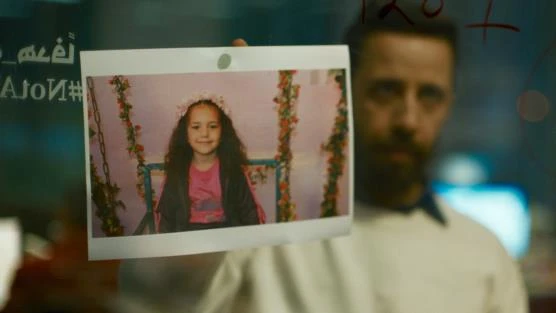Opening Night Film, Ajyal Feature Film Competition
A single call becomes a measure of our humanity. The recorded voice of a child anchors a patient, devastating account told through those who tried to save her. What unfolds is less reconstruction than remembrance: a film built around a real voice, guided by those who listened, waited and refused to abandon hope. Dramatised with ethical care, it invites us to feel the weight of time, silence and responsibility, and to preserve a name, asking what it means to answer a plea that the world needs to hear.
A single call becomes a measure of our humanity. The recorded voice of a child anchors a patient, devastating account told through those who tried to save her. What unfolds is less reconstruction than remembrance: a film built around a real voice, guided by those who listened, waited and refused to abandon hope. Dramatised with ethical care, it invites us to feel the weight of time, silence and responsibility, and to preserve a name, asking what it means to answer a plea that the world needs to hear.
On 29 January 2024, emergency responders received a call from a six-year-old trapped in a car under fire in Gaza. They kept her on the line and did everything possible to reach her. The recorded voices on that call are real; the film is built around them. Rather than reporting, it remembers, holding stillness, waiting, fear and the fragile thread of connection that binds people who cannot meet but will not let go. The narrative follows those on the other end of the phone: Red Crescent staff whose own words articulate not only what happened but the visceral horror of what it felt like to be there.
Their testimonies, alongside the archival audio, guide a carefully staged dramatisation in which actors hear the authentic voice as they speak, re-inhabiting a lived moment rather than performing it. The effect is intimate, affecting and truly devastating. What emerges is a damning indictment of systems that fail children and a study of collective responsibility. In this space between documentary and fiction, truth is carried by voice. The film becomes a memorial and a demand, naming a child, honouring the people who answered, and asking audiences to share the burden of listening. To hear is to be changed; to remember is a refusal to let violence be perpetrated in silence.
Their testimonies, alongside the archival audio, guide a carefully staged dramatisation in which actors hear the authentic voice as they speak, re-inhabiting a lived moment rather than performing it. The effect is intimate, affecting and truly devastating. What emerges is a damning indictment of systems that fail children and a study of collective responsibility. In this space between documentary and fiction, truth is carried by voice. The film becomes a memorial and a demand, naming a child, honouring the people who answered, and asking audiences to share the burden of listening. To hear is to be changed; to remember is a refusal to let violence be perpetrated in silence.

